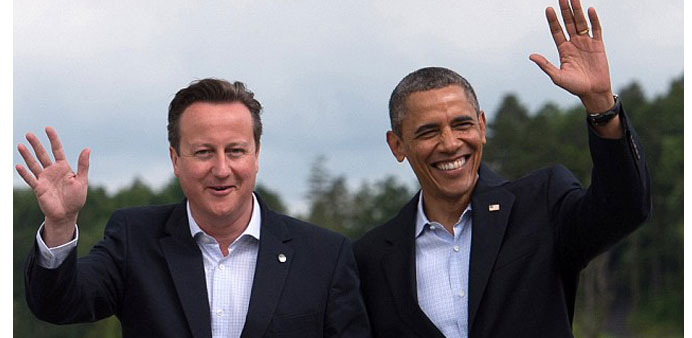Reuters/Washington/Beirut
President Barack Obama and his allies sought to convince cautious lawmakers and the public of the need to strike Syria although officials conceded yesterday they lacked conclusive evidence that President Bashar al-Assad ordered his forces to use chemical weapons against civilians.
Obama’s top national security officials were due to brief Congress on Syria later yesterday and Britain said armed action would be legal, but any intervention looked set to be delayed until UN investigators report back after leaving Syria tomorrow.
Syrian opposition sources said Assad’s forces had removed several Scud missiles and dozens of launchers from a base north of Damascus, possibly to protect them from a Western attack, and Russia was reported to be moving ships into the region.
But expectations of imminent turmoil eased as the diplomatic process was seen playing out into next week, and the White House emphasised that any action would be “very discrete and limited,” and in no way comparable to the Iraq war.
The US and its allies have “no smoking gun” proving Assad personally ordered the attack on a rebel-held Damascus neighbourhood in which hundreds of people were killed, US national security officials said.
In secret intelligence assessments and a still-unreleased report summarising US intelligence on the alleged gas attack on August 21, US agencies expressed high confidence that Syrian government forces carried out the attack, and that Assad’s government therefore bears responsibility, US national security officials said.
US Secretary of State John Kerry and Secretary of Defense Chuck Hagel were among senior US officials expected to brief congressional leaders later yesterday. Some lawmakers complained they had not been properly consulted.
While UN chemical weapons inspectors spent a third day combing the rebel-held area where the attack took place, elsewhere in Damascus traffic moved normally, with some extra army presence but little indication of any high alert.
A parliamentary debate in London revealed deep misgivings stemming from the 2003 invasion of Iraq. After pressure from lawmakers, the British government - a key player in any proposed air assault on Syria - has promised parliament a decisive vote once the UN weapons inspectors report their findings.
The UN said its team of inspectors would leave Syria tomorrow and report to Secretary General Ban Ki-moon.
British Defence Secretary Philip Hammond told Israel’s Channel Two TV there would then be a “genuine attempt” to pass a Security Council resolution before another vote in the British parliament, a process he said could take some days.
France and Germany urged the world body to pass its report on to the decision-making Security Council as soon as possible “so that it can fulfil its responsibility with regards to this monstrous crime”.
The US, Britain and France say they can act with or without a UN Security Council resolution, which would likely be vetoed by Russia, a close ally to Assad. However, some countries are more cautious: Italy said it would not join any military operation without Security Council authorisation.
Western diplomats say they are seeking a vote in the 15-member Council to isolate Moscow and demonstrate that other countries are behind air strikes.
A report from Moscow that Russia is sending two warships to the eastern Mediterranean underscored the complications surrounding even a limited military strike, although Russia has said it will not be drawn into military conflict.
The five veto-wielding permanent UN Security Council members met again yesterday. The five - the US, Russia, China, Britain and France - held an inconclusive meeting on Wednesday to discuss a draft Security Council resolution that would authorise “all necessary force” in response to the alleged gas attack.
British Prime Minister David Cameron lost a symbolic but important parliamentary vote last night meant to pave the way for Britain to join a looming military strike on Syria. Cameron said after the 285 to 272 vote he would not override the will of parliament and approve such action, saying it was clear that parliament did not want to see a military strike on Syria to punish it for chemical weapons use.
Syria’s cultural heritage being looted: Unesco
As the world argues over how to prevent more civilian deaths in Syria, Unesco warned yesterday that a rich cultural heritage was being devastated by the conflict now in its third year.
Clashes have damaged historical sites and buildings throughout the country, from Aleppo’s Umayyad Mosque to the Crac des Chevaliers castle dating from the 13th century Crusades.
But the most irreversible damage comes from the illegal looting of artefacts from archaeological sites for export, said the UN cultural arm’s assistant director-general for culture, Francesco Bandarin.
“We had it in Iraq, we had it in Afghanistan, in Libya, in Mali,” Bandarin said. “It is a typical by-product of war. Unfortunately it’s very difficult to stop.”
Organised, armed gangs sometimes involving hundreds of hired men who threaten local residents against retaliation are taking advantage of a lack of security at many archaeological digging sites.
A comparison of satellite images from before the crisis and today at Apamea, known for its extensive Hellenistic ruins, shows clearly the scale of looting and destruction, Unesco said.
Precious objects have been identified for sale in Beirut.

